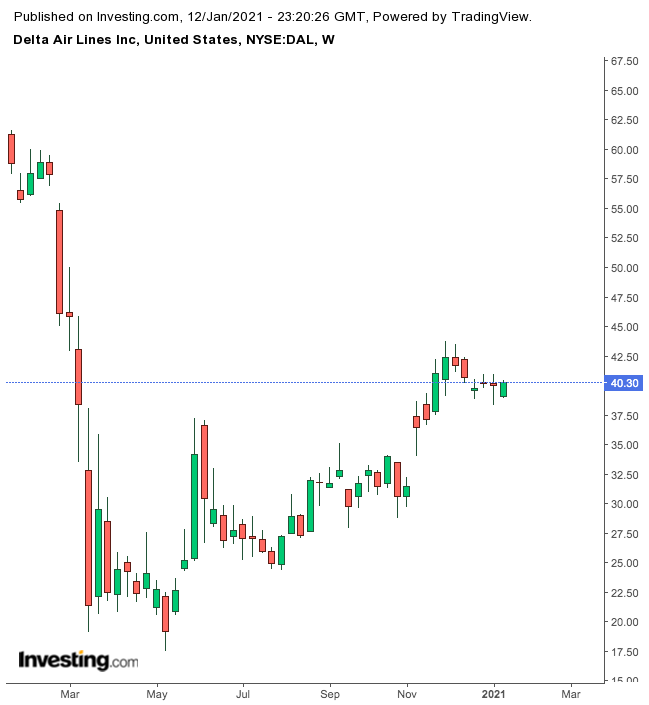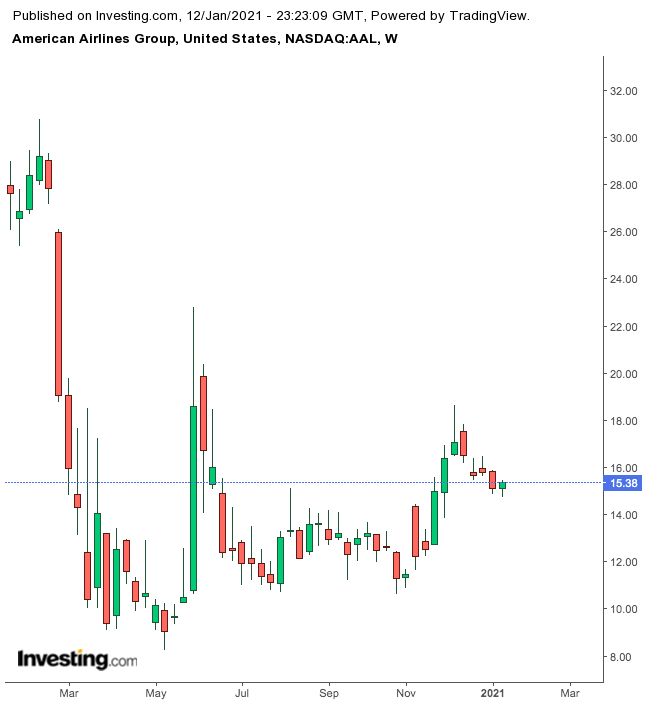A sharp recovery in airline stocks during the fourth quarter will soon face its first test when US carriers begin reporting Q4 earnings starting this week. One of the major players, Delta Air Lines (NYSE:DAL), will kick off the industry’s earning season on Thursday, Jan. 4, before the market open. Investors will focus on its cash-burn rate and any sign of recovery in business travel.
After enduring a drastic plunge in travel demand during the past 12 months, some investors have started to feel comfortable owning airline stocks. After November's vaccine breakthroughs, airline shares surged, pushing the world’s largest airlines-focused ETF, US Global Jets Fund (NYSE:JETS) higher. It's gained 22% during the past three months.
That rally showed investor confidence that the successful development of vaccines will help improve travel demand and ultimately benefit the stock market’s most-battered members. The pandemic ended the decade-long streak of profits enjoyed by airlines, sparking losses of more than $20 billion for the segment last year.
But a turnaround in travel demand may not come too soon. There could be considerable delay amid surging coronavirus cases and the discovery of more infectious variants.
When Delta reports tomorrow, analysts are expecting, on average, a loss of $2.42 a share on sales of $3.81 billion. The airline's CEO, Ed Bastian, in a new year’s memo, told employees that the carrier continues to aim for positive cash flows by the spring in a “year of recovery.”

Still, Bastian warned that travel demand will remain “deeply depressed” initially, with the company’s focus on health and safety for passengers:
“While I am optimistic this will be a year of recovery, the continued uncertainty of the pandemic means we’ll need to be nimble, ready to adjust our course and adapt to an ever-changing environment.”
Not A Compelling Story
Shares of Delta Air closed yesterday at $40.30, after gaining 20% during the past six months. Even with this jump, Delta shares are still down more than 30% when compared with this time last year. Shares in American Airlines (NYSE:NASDAQ:AAL), the most troubled big US carrier, remain 45% lower.

Even if we factor in a potential reopening of the economy later this year, airline stocks don’t offer a compelling investing case, in our view. It’s highly unlikely that airlines will achieve the kinds of profit margins that came with the longest US economic expansion before the 2020 recession. One key factor is the grim outlook for business travel, which drove demand for premium seating before the pandemic.
In a recent note, Cowen & Co. analyst Helane Becker highlighted these headwinds, describing Delta Air’s optimism as “aggressive,” as corporate travel remains down 85% and the only corporate traveller flying now appears to be those at small and medium-sized businesses.
Becker wrote:
“Delta had hoped for a recovery in business travel in 2H21, but it is becoming increasingly clear that business travel will not be a meaningful contributor to revenue in 2021 as vaccination timelines continue to shift.”
According to some estimates, the business category could end up being as much as 15% smaller because of the videoconferencing trend that took off during the pandemic.
According to Deutsche Bank, US airlines will continue to struggle with a record debt load of $170 billion. That means “airlines will have no choice but to allocate the majority of their free cash flow to debt paydown,” the bank said in a recent note.
Still, investors can find interesting growth stories in the airline industry, mainly from low-cost operators like Southwest Airlines (NYSE:LUV) and Allegiant (NASDAQ:ALGT), which are capable of gaining in a world of cheap fares.
Bottom Line
Investors should be selective in picking airline stocks as it’s almost impossible for some big carriers to return to normal operations in 2021. This earning season will likely show that the time to bet big on them has not arrived yet.
